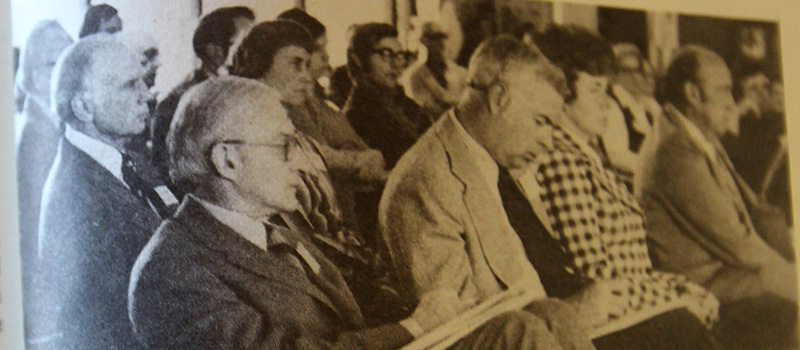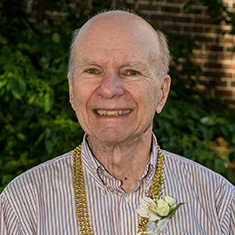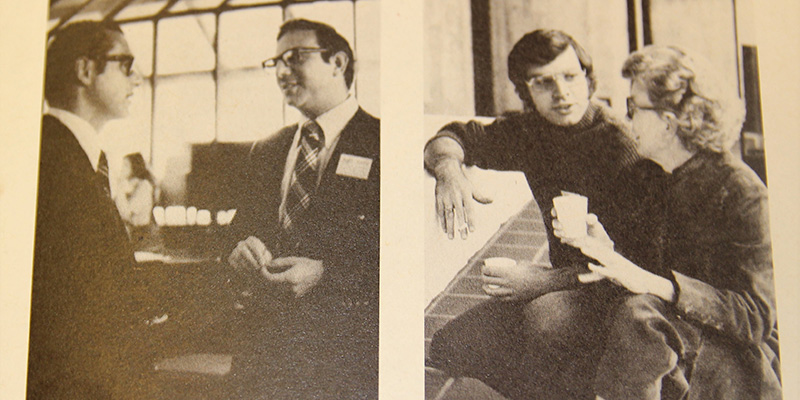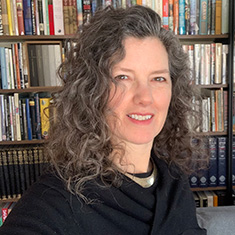50 years after inception, Grinnell’s CFD program continues to flourish
February 16, 2023 — In September 1972, 36 freshly recruited class fund chairmen arrived at Grinnell College to start engaging in a new program that centered around fundraising with a personal touch.
Within two years, the name of this volunteer position was altered to class fund director (CFD). But the basic premise of having alums represent the College as peer-to-peer class development officers to help the College achieve its strategic goals has stayed constant for 50 years.
 A picture from a 1972 Grinnell Magazine article shows the first cohort of class fund chairmen learning about their new roles.
A picture from a 1972 Grinnell Magazine article shows the first cohort of class fund chairmen learning about their new roles.
“It became clear to knowledgeable alumni that if Grinnell is to continue to be a front-rank college of the liberal arts, larger number of alumni must be encouraged to rearrange their priorities, so that each will feel important and indeed critical to participate in the financing of this small Iowa college of distinction,” wrote James O. Avison, Grinnell’s vice president for resource planning, in a 1972 Grinnell Magazine article introducing class fund chairmen.
During the past half century, CFDs have helped create or strengthen countless relationships with classmates.
“I think first and foremost we help the College increase its resources,” says Sasha Aslanian ’90, a longtime CFD, Alumni Council member, and parent of a first-year Grinnell student. “We remind others of the reasons that we give, and hope to stir that same kind of inspiration in our fellow alumni.”
While Aslanian acknowledges there are numerous ways alumni can help the College other than giving, she’s not ashamed to ask for financial support. “I don’t think money is a dirty thing. We need funding in order to create these exceptional opportunities for Grinnell students.”
That message is music to the ears of Mae Parker, director of annual giving.
“Annual giving by alumni is a crucial element to sustaining this amazing educational community,” Parker says. “The CFD program is front and center as the peer connection in annual giving. We have been so grateful over the last 50 years to grow the program as a vehicle to strengthen fundraising for the College. Thank you to all the past and present volunteers for your dedication to making the CFD program such a success.”
The first chairmen
 Bill Ingram ’53
Bill Ingram ’53
Bill Ingram ’53 received a phone call in 1972.
“Would you like to be a class fund chairman?” the caller asked.
“Would I like to do what?” Ingram recalls replying.
The caller went on to explain what the position entailed. Ingram asked who recommend him for the role. The caller didn’t know. He just had Bill’s name. Ingram said, “sure.” And that’s how he got the gig – the first time.
Ingram was one of 53 initial chairmen charged with annual fund solicitations within their classes. An alum was chosen from nearly every class from 1914 to 1971. While initially called chairmen, several women served in the role. It’s not clear whether that fact helped spur the title change to class fund directors.
Today there are 150 class fund directors spanning the years of 1951 to 2022. According to the College’s available historical records, there have been nearly 400 alums serving in the role all-time.
The class fund chairmen initiative began during a campaign known as the AIM II program, which concentered on boosting unrestricted giving. (The earlier AIM I campaign was designed primarily to raise money for constructing new buildings.)
In 1972, less than 20 percent of alumni were active financial contributors. A goal of the chairmen program was to bring Grinnell’s participation level to 30-45 percent, Avison noted in the magazine article. (For comparison, over the last five years, fiscal years 2018-2022, the average alumni participation percentage was 28.4 percent.)
A Class Fund Chairmen campus conference was held Sept. 27-29, 1972, to familiarize the chairmen with College academic and financial programs and to make their contact with alumni more effective in subsequent years. The conference was funded by a gift from an anonymous donor.
 The first class fund chairmen had plenty of conversations in September 1972 while attending a kickoff conference on campus. Pictured, left to right, were class fund chairmen Arnold Alpert ’58, William Siskel, ’60, John Wiles ’68, and Pirkko Roecker, folk dance instructor.
The first class fund chairmen had plenty of conversations in September 1972 while attending a kickoff conference on campus. Pictured, left to right, were class fund chairmen Arnold Alpert ’58, William Siskel, ’60, John Wiles ’68, and Pirkko Roecker, folk dance instructor.
According to a 1972 Scarlet & Black article written by Don Dagenais ’73, campus leaders who spoke with the chairmen during the conference were Avison, President Glenn Leggett, Dean of Administration Waldo Walker, and Robert B. Nichols ’39, president of the Alumni Association Board of Directors.
“We had a pretty active volunteer group return to the campus program back then,” Ingram says. “We had a good conference, and I got to see some of my old professors. That was a good kickoff.”
The chairmen where then turned loose to start their work, which at that time consisted of a minimum of two informal letters to classmates each year. Ingram said his classmates knew the College periodically reached out to solicit donations. “Early on, my classmates assumed I was a further extension of the send-us-money brigade. They were humorously acceptant of my letters.”
Original Class Fund Directors
1912 Florence Stewart Kerr
1913 Jennie Rule Hammond
1914 Pearl Neel Fellows
1915 Gretchen Steiner Hightshoe
1917 E. Donald Meacham
1918 Richard C. Budlong
1920 Morris C. Leonard
1921 Fred A. Winter
1922 H. Kenneth Ferguson
1923 Robert B. Atwater
1924 Richard M. Steiner
1925 G. Lester Duke
1927 Eleanor E. Selby
1929 Harold R. Colbert
1931 Elizabeth Cook Parish
1933 Harold E. Alexander
1935 Joseph L. McKlveen
1936 Bernard E. Trumbull
1937 Baxter R. Smith
1938 Catharine Bousquet Evans
1939 John H. Harris
1940 Carl J. Atkins
1941 Richard E. Adkins
1942 Thorn Kuhl
1943 Charles F. Glaman
1944 Ruth Hackett Kaufmann
1945 George B. Vanstrum
1946 Mary Ann Hush McCoy
1947 Lonabelle Kaplan Spencer
1948 Gertrude Rosenberg Rothschild
1949 Donald L. Snook
1950 Melvin J. Adams
1951 Duane M. Blough
1952 R. Jennings Payette, Jr.
1953 William Ingram
1954 Herbert G. Lancaster
1955 Thomas K. Marshall
1956 R. Warren Sandler
1957 John F. Egan
1958 Arnold I. Alpert
1959 Gerald L. Thompson
1960 William J. Siskel
1961 Judy Mahle Lutter
1962 Dale B. Furnish
1963 Robert H. Gwynne-Vaughan
1964 George W. Forrest
1965 Anne Young Pilgrim
1966 Lloyd J. Fritzmeier
1967 Stephen K. Kent
1968 John R. Wiles
1969 Tom J. Triplett
1970 Sam R. Chandler
1971 Jean M. Kummerow
CFDs in the modern world
Ingram served as a CFD until 1980. In 2015-16, the then class of 1953 CFD fell ill so Ingram – who also is the 1953 class agent – stepped in to assist before eventually taking back over the role. Once again, he was writing letters.
“I enjoy writing the letters,” he says. “It’s always a challenge to figure out how to write a letter that will have any effect, though you never really can tell because there are so many things feeding into what might result in a response from a classmate. Nonetheless, it’s fun looking for ways to write letters and trying to figure out if the pitch will work. I’m sure it’s different for people my age than it is for younger people.”
Communication methods, of course, have proliferated over the last five decades, and today’s CFDs have numerous methods to interact with classmates, such as email, texting, phone and video calls, social media, and instant messaging. The systems for organizing and tracking information has evolved to Google Sheets and the GiveCampus volunteer management system.
 Jasper Egge ’20
Jasper Egge ’20
“It’s so much easier now in terms of reaching out to people, but I’m wondering if that also means it’s easier to ignore messages,” says Jasper Egge ’20, who along with Kate Irwin ’20 serve as the class of 2020 class fund directors. “Communication back then was more rare, so I think people checked everything. Now, it’s trivially easy to ignore an email.”
While born 27 years after the CFD program at Grinnell began, Egge has some knowledge of historical fundraising through his mom, who is director of the alumni annual fund at Carleton College. “The environment around college fundraising is different today, so it feels weird to compare it to what was done in the 1970s,” he says.
As a student, Egge worked in Grinnell’s Phonathon program and deeply enjoyed talking with alums. “Becoming a class fund director was a natural extension,” he says. “The class of 2020 is special in terms of giving because we didn’t get a graduation. That sounded like an interesting conundrum that I was happy to be a part of.”
It hasn’t been easy thus far.
“I think a good chunk of my class realizes the importance of scholarships and that Grinnell needs resources to provide for its students,” Egge says. “But some people can’t give right now. For those that can, they ask why they should give to Grinnell as opposed to this other totally valid thing. In a world that is on fire that they were thrust into, why should this place be where they give? I think that’s the hardest thing for me to answer.”
But he attempts to, noting participation is important. Small gifts are super important. “It’s not just helping out Grinnell; it’s also being a part of that community,” Egge says.
Customizing class priorities
A supervising producer at ABC News, Aslanian feels an incredible gratitude for Grinnell.
 Sasha Aslanian ’90
Sasha Aslanian ’90
“Grinnell really influenced the trajectory of my life,” she says. “I’ll be paying Grinnell back my whole life. The best way I can do that is to try to pay it forward so that other people get to benefit from the mind-opening experience that is a Grinnell education. I’m super proud of Grinnell’s need-blind admission policy and the no-loan policy. Alumni support is absolutely crucial for Grinnell to continue to offer this exceptional education to the most deserving people regardless of their ability to pay.”
Aslanian said peer-to-peer messaging by class fund directors is a good mechanism to convey this message but there are other benefits as well. It generates friendly competition among classes and leads to additional volunteerism. But perhaps most importantly, the peer-to-peer model can account for the personality and particular experience of a class, and what’s important to the class in terms of giving priorities.
She tells the example of her classmates coming up with an idea to endow a scholarship in memory of Reva Bansal ’90, who passed away in Europe shortly after leaving Grinnell.
“We created a scholarship for an international student who shared Reva’s passion for public health,” Aslanian says. “When those who knew her best reached out to her family in India to let them know the scholarship was in the works, they were very moved by it. It was a really wonderful mark of connection to let them know that Grinnellians still cared and missed Reva and wanted to advance what was important to Reva in this world, which is improving the health of women in the developing world.”
The scholarship has been awarded the last two years to students from Zimbabwe and India.
“I thought it was a nice personal example,” Aslanian says. “If the College was just doing its general fundraising, it might not have these particular contours of managing to remember someone, inspire giving, and make a directed scholarship. That’s the kind of creative and tailored approach that the CFD program encourages and makes possible.”
— by Jeremy Shapiro